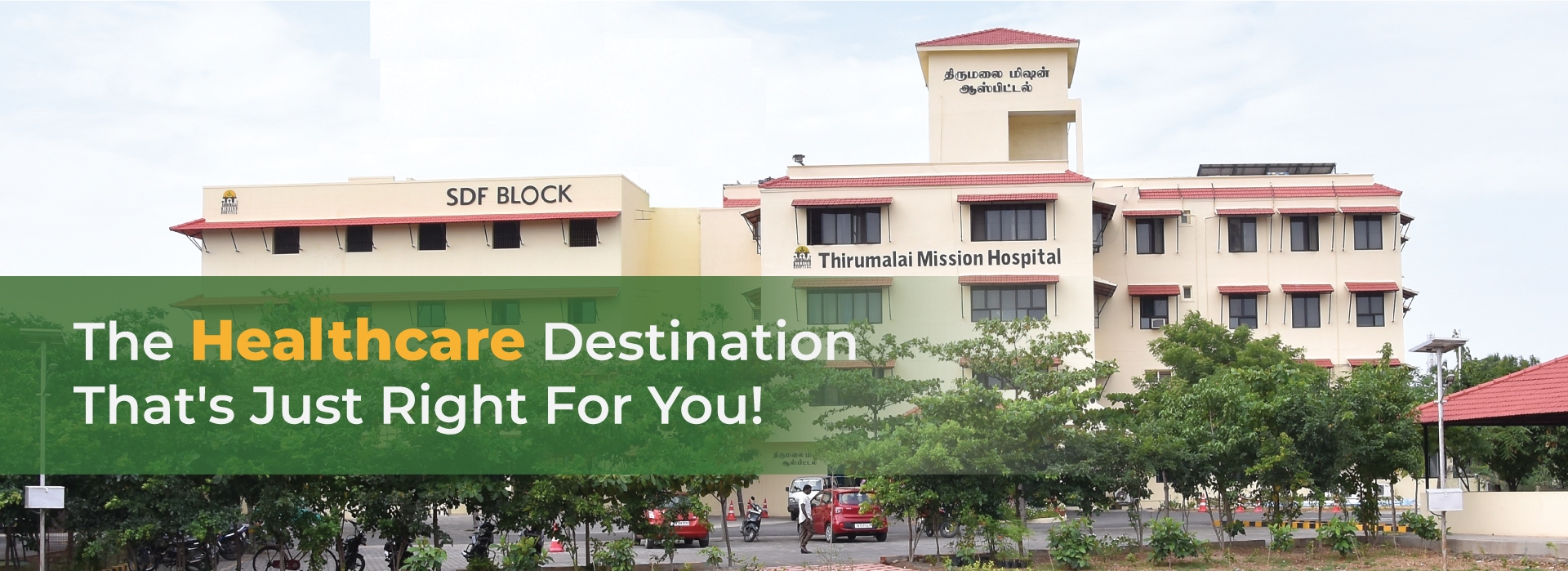
TCT confidently founded the Thirumalai Mission Hospital (TMH)in April 2010 – a quality Hospital to serve all sections of society. TCT hopes to develop this into a replicable model of a Secondary Care Hospital that is viable and provides quality, ethical, accessible and affordable rational health care.
Built on a 5-acre plot, operating with 50 beds out of a spacious, well-ventilated building that has ground plus three floors with a built-up space of more than 30,000 sq. feet. TMH is accredited for quality by National Accreditation Board for Hospital and Healthcare Providers.
It started as OP centres in Ranipet and Thiruvalam in 2009 as the building for the hospital was coming up.
TMH was started with about 10,000 sq.ft. on the ground plus one floor in 2010 and by 2014 added the second and third floor and added another 8000 sq.ft. A new block with an emergency on the ground floor and an outpatient centre for diabetes on the first floor, a research and training centre on the second floor and an admin office on the third floor came up between 2014 and 2019 adding another 13,000 sq. ft. The external facilities for vehicle parking and a garden were also developed. All the required medical, non-medical and office equipment for outpatient and inpatient care were also added.
The highlights of strengths of the hospital to aid good medical services and unique services include the following:
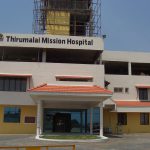
TMH under construction 2009
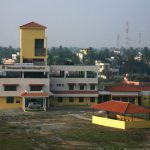
TMH 2010
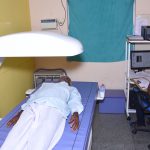
Dexa scan for detecting osteoporosis
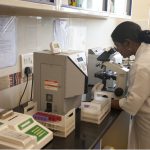
EQAS - Laboratory
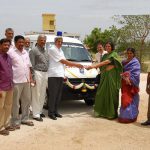
Ambulance
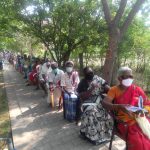
Camps at the hospital
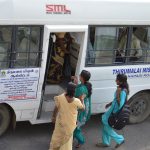
Patient Transport
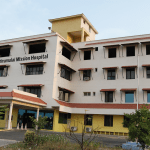
TMH 2013
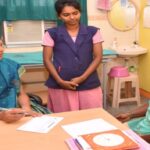
Cancer Screening in Women
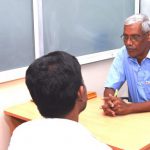
N. R. Swamy center started
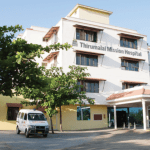
TMH 2015
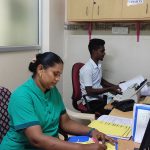
Electronic Medical Records
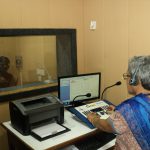
Audio Lab
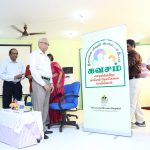
Kavasam Project Launch
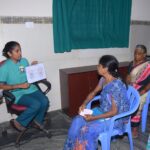
Diabetes Centre
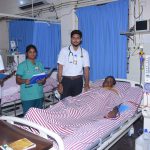
Dialysis facility started
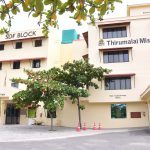
TMH 2018
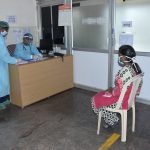
COVID Care
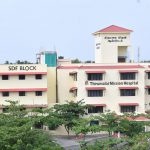
TMH 2020
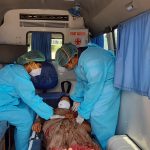
Mobile medicare van in use at a diabetes camp
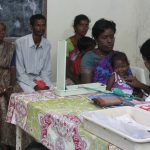
Rural Centres 2021

Just for Girls: Coaching in Football
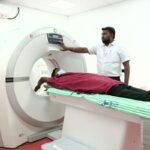
TMH Health Centre
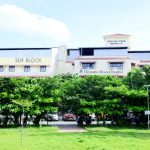
Hospital 2022
The hospital provides outpatient and inpatient services in Emergency, General Medicine, General, Surgery, Obstetrics and Gynaecology, Paediatrics, Orthopaedics, E.N.T., Pulmonology, Cardiology, Nephrology and Dentistry. Physiotherapy and dialysis services are also provided. The hospital’s laboratory and diagnostic services offer reliable results and are benchmarked for quality assurance. Our expertise is well known in the area of prevention, care and control of non-communicable diseases: diabetes, hypertension, osteoporosis, as well as screening for oral, cervical and breast cancer. For more details, visit http://tmh.health/
We believe that all patients are entitled to the same level of care irrespective of their social status and affordability. This is sincerely practised across all our units and departments.
The Thirumalai Charity Trust has identified a closed loop model where primary healthcare and secondary healthcare are implemented in an integrated approach. Before embarking on steps to improve health care in the rural community, common health problems need to be identified and their prevalence assessed. Health care models should be developed based on the needs of the community and the predominant health problems. Our field staff are trained to implement basic primary care in the village. If the patient needs further care, they are given a referral to the hospital. Our field staff then does a house visit with the patient to ensure they meet their appointments, get the required medicines, and are getting the right counselling. Lastly, to close the loop, they continue to monitor the patient and encourage follow-ups if required. In this effort, the community is engaged and this shared responsibility helps the doctors keep track of their patients. At TMH, we hope to offer a unique way of scaling the potential to reach communities, with the support of Family Care Volunteers who work in their rural areas to find and follow up with patients seen at TMH.
Non-Communicable Diseases (diabetes, cardiovascular diseases, hypertension, stroke, osteoarthritis, ageing-related impairments, bronchial asthma, oral, breast and uterine cancer, etc) and secondary/tertiary health care needs of women and children far surpass communicable diseases as the leading cause of death, lost productivity and out of pocket expenses.
Our Thirumalai Charity Trust (TCT) with its twin health service provider teams -Community Health Services (CHS) and Thirumalai Mission Hospital (TMH), has a thirty-year track record of impacting the healthcare-seeking behaviour of our outreach community. During the past 10+ years, in response to changing morbidity patterns and to address the gaps in the existing healthcare system, and inadequacies with the state care providers, our services had shifted focus to the prevention and control of NCDs. Since we set up TMH in 2010, in addition to prevention and care, we are also directly provisioning NCDs care.
We offer comprehensive care for those affected with NCD at the hospital and through a network of primary health care providers established in the community. In doing so, it prevents secondary level complications and reduces morbidity and mortality. We have served a significant number of people in the NCD programmes.
The TMH offers a heavily subsidised annual package for patients with diabetes and hypertension since 2014. Patients enrolled are cared for comprehensively with planned visits to the hospital twice a year to go through lab tests, screening for complications and see the physician. The patients and their caregivers are educated on the conditions and their complications and are offered diet and physical therapy advice. They are monitored in their homes by the field staff every month. During such visits, the field staff choose to share with the physician any abnormal values of sugar and BP and get the required help for the patients. This continuous and comprehensive model of care has proved to be very effective in controlling the diseases in a majority of the patients.
The word means “softening” of bone (literally, bone becoming “porous” and hence fragile) and is a common problem among senior citizens. Even an accidental fall or a sudden jerk can damage bones if there is osteoporosis. It is, therefore, necessary to assess bone density in women who are 5 years post-menopause and men over 60 years. It is necessary for preventive measures can be instituted if there is a problem. The DEXA Scan is a specialised x-ray type of equipment available at our hospital to assess this condition. Eligible men and women from the community are offered a free DEXA scan at the hospital. If they have osteoporosis or osteopenia, they are educated on their condition and the need for lifelong treatment with vitamin d and calcium supplements. These medicines are heavily subsidised for them and they are supplied these medicines in their homes by our field staff every month when the staff also collect details about their conditions and present the details to the physician. These simple, easy-to-follow, standardised treatment procedures to prevent bone fracture and resultant disability is very effective. This is one of the unique initiatives of the TMH that has been recognized in medical forums. This programme is ongoing since 2012
In the minds of the general public, obesity per-se is not considered a health issue although medically it is known to be strongly associated with many diseases including diabetes, hypertension, cardiovascular problems, menstrual problems, infertility, arthritis, stroke, sleeplessness, eye disorders and impotence. Changing lifestyle and fast-food-type eating habits contribute to the increased number of obese people in our community. We at TMH believe strongly that this is a health concern that needs to be addressed, and is one of the focus areas of our hospital towards improving the overall health status of our community. We integrate this as an important aspect of treatment for all the patients we care for. All the men and the women who go through any screening in the community are assessed for obesity with the BMI indicator. Adolescent children are provided with diet education and the need to be active. Obesity is an education topic for them in schools. For weight reduction, we offer diet and nutrition education, advice on regular exercise and counselling on lifestyle modifications. Life-long and sustained attention gives excellent results and improves health. This is a continuing programme for the community since 2017.
Cancer screening in the cervix and breast in women was carried out in the community from 2012 to 2019. Our method to screen women is a well-established and recognized one. More than 9000 women were screened and those suspected with possible lesions were assessed in detail at TMH and referred
Oral cancer screening was carried out in the villages for over 4000 people from 2017 to 2019. Both tobacco users and non-users participated in the programme. Those with possible lesions were assessed with biopsy and those positive and those with precancerous lesions and conditions are provided follow-up care.
To implement its model of care, TMH offers a separate line of care for the community patients in camps. All the departments of the camps conduct camps in the hospital on a monthly or fortnightly basis. A few departments also conduct camps in the outpatient centres at SIPCOT, Seekarajapuram and Keeraisathu. The patients seen in these camps are followed up by the field staff and their revisit for consultation and needed treatment is ensured.
Eye camps are conducted in collaboration with Aravind Eye Hospital every month. After screening, soon after the camp, selected patients are taken to Aravind Eye Hospital for cataract surgery and other treatment and brought back within two days. Follow-up care for them is provided in the subsequent camps.
Thirumalai Mission Health and Medical Research Unit is registered with the Drugs Control Authority of India since 2015. It undertakes community health research and epidemiological studies under the guidance of an Institutional Ethics Committee. A few studies on diabetes, osteoporosis, cancer in women and osteoporosis have been published.
